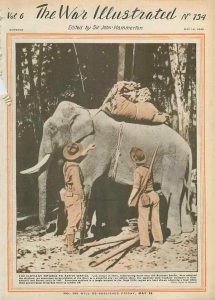What a strange scene it must have looked — an elephant pulling a cart up and down the cobbled streets of Sheffield. It might have looked like the circus was in town, but this exotic beast was actually playing a big part in helping Britain during the First World War, helping carry heavy loads at a scrap metal merchants. I know — it sounds unbelievable — but it is true.
You see, there was a massive shortage of horses during WWI because the military had sent most of them to the Western Front. Farmers and traders were at a loss, left looking for an alternative and for any animals that could fill the gap. Lizzie the Indian elephant fit the bill and got a job carting munitions, scrap metal and machines around Sheffield, which was a job previously done by three horses before they got sent to war.
Now, an elephant wasn’t conventional, but it was powerful, it was there at the time and it filled the vacancy, literally! Once part of a travelling menagerie, Lizzie the elephant used to perform tricks until war broke out and she was conscripted to help with heavy labour — her life during World War One suddenly changed, just like everyone else’s. Lizzie was fitted with a harness and she was given a special pair of leather boots to protect her feet from the metal waste that covered the ground at the scrap metal yard. “By 1916 most of their heavy horses had gone to the front,” Sheffield amateur historian, Clare Trowell told the BBC. “Lizzie was an Indian elephant, intelligent and trainable – she would’ve been used to people because she was part of a menagerie. “She would’ve have been traipsing up and down the streets where people lived, it would’ve been an odd image. “She was quite a character – there’s a story about her putting her trunk into somebody’s window and stealing their dinner.” According to sources, camels that were probably from the same menagerie as Lizzie were also used in and around Sheffield. It must have been quite an interesting place to live for any animal lovers back then.

Even more surprisingly, this wasn’t the only elephant in Britain helping with the war effort. In Horley, Surrey elephants from a circus also filled in for the missing horses and even helped to plough fields and transport hay and agricultural loads around farms. Apparently, these elephants were from ‘Lord Sanger’s Circus’, which when it wasn’t travelling, based itself in the area. “You grow up thinking elephants are African or Indian animals – so seeing them wandering around Horley in World War One, would’ve been quite a shock,” Alan Reid, from the Horley History Society told the BBC. “They were heavy animals and would have been very useful pulling ploughs and carrying stuff.” An estimated 1.2m horses and mules were used by the British Army during the war, with about 484,000 dying. During the war the Blue Cross, a British animal welfare charity, raised funds for their treatment, reported the BBC. “The horse was still the main way of moving things,” said Steven Broomfield, manager at the Blue Cross’ Victoria Hospital. “Most of the field artillery and lighter stuff was all horse drawn – the bulk of heavy lifting was done by horse power. “They were much more reliable, didn’t break down too quickly, were cheap to run and easy to mend compared to early trucks. “It was not an easy life – an awful lot would’ve been killed by shellfire or disease. “But there’s a war to win and quite frankly we would be using all the tools and equipment we had to hand, including elephants.”
Apparently, little is known how Lizzie ended up at the ship breakers and scrap metal merchant ‘Tommy Ward’s’ in Sheffield, or about her fate after the war. Interestingly her legend partly lives on in an expression used in the area to describe someone carrying something heavy: “done up like Tommy Ward’s elephant”.
Source: BBC


